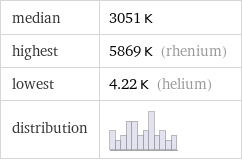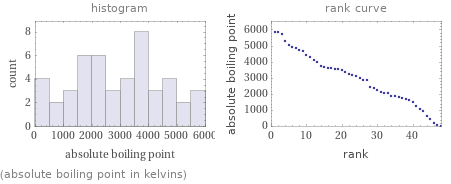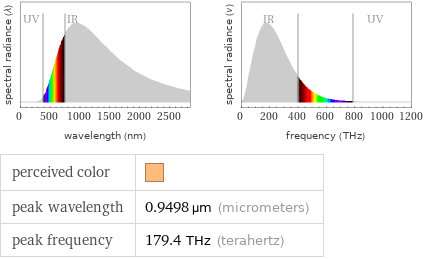Input interpretation

dying low mass star elements | absolute boiling point
Summary

median | 3051 K highest | 5869 K (rhenium) lowest | 4.22 K (helium) distribution |
Units

Distribution plots

(absolute boiling point in kelvins)
Absolute boiling point rankings

1 | helium | 4.22 K 2 | nitrogen | 77.36 K 3 | xenon | 165.1 K 4 | iodine | 457.4 K 5 | mercury | 629.88 K 6 | cesium | 944 K 7 | cadmium | 1040 K 8 | tellurium | 1261 K 9 | ytterbium | 1469 K 10 | lithium | 1615 K ⋮ | | 39 | ruthenium | 4423 K 40 | zirconium | 4682 K 41 | iridium | 4701 K 42 | hafnium | 4876 K 43 | molybdenum | 4912 K 44 | niobium | 5017 K 45 | osmium | 5285 K 46 | tantalum | 5731 K 47 | tungsten | 5828 K 48 | rhenium | 5869 K
Unit conversions for median absolute boiling point 3051 K

2778 °C (degrees Celsius)

5032 °F (degrees Fahrenheit)

5492 °R (degrees Rankine)

2222 °Ré (degrees Réaumur)

1466 °Rø (degrees Rømer)
Blackbody information for median absolute boiling point 3051 K (kelvins)

perceived color | peak wavelength | 0.9498 µm (micrometers) peak frequency | 179.4 THz (terahertz)
Corresponding quantities

Thermodynamic energy E from E = kT: | 26 ceV (centielectronvolts)

Blackbody energy flux Φ from Φ = σT^4: | 4.913×10^6 W/m^2 (watts per square meter)

Approximate luminous exitance from a planar blackbody radiator perpendicular to its surface: | 1.093×10^8 lx (lux)